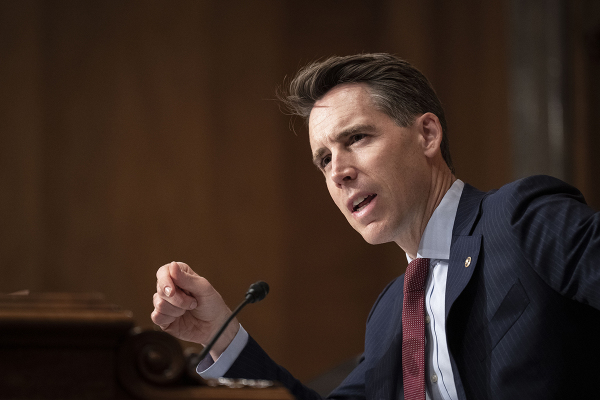How a church's Deaf ministry is sharing the Gospel with the Deaf community
'Good chunk of life' in deaf ministry
Roddey Caughman, the associate pastor and Deaf ministry director of Redemption Hill Church, who has worked alongside the Chopeks in leading the church’s Deaf ministry, said he is not considered Deaf. But, in the past 10 years or so, he has become hard of hearing in one of his ears.
Well before he began to lose his hearing, Caughman studied ASL starting at age 13.
"My wife, Becky, and I, both, are nationally certified ASL interpreters for the Deaf. We're both fluent in American Sign Language. We've been around it for a long time. Right before I became a Christian, when I was about 13 years old, there was a boy the same age who lived near me who was Deaf. I started learning ASL from him, and we are still good friends to this day," Caughman told CP.
"In my senior year in high school, I came to faith in Christ, and that same weekend that I came to faith in Christ, I figured, 'Well, I think God probably will want to use me to minister to the Deaf.' But, I had no idea what that meant at the time."
When Caughman entered college, he became involved in a campus ministry while also working with a church’s Deaf ministry. He said doing those ministries in that capacity further solidified the calling that he believes God placed on his life.
"I graduated from college, and I began to pursue ministry opportunities, starting out just basically as an ASL interpreter for church services. And then, that led me to work as a dormitory counselor at the Tennessee School for the Deaf. I did that for five-and-a-half years. That's where I met my wife, Becky. She was doing the same exact work as me," Caughman said.
Caughman and his wife married in Knoxville and had their first child there. As a family, they moved to South Carolina. After making the move, the couple worked for many years as educational interpreters for Deaf students from kindergarten to college age.
The couple later moved to Pittsburgh, where Caughman took the role of the Deaf ministry director at Redemption Hill Church.
"I've also worked as a missionary. My wife and I were both missionaries in South America for the Deaf. Overall, we've worked with the Deaf community in various ministry and non-ministerial roles from 1988 until now," Caughman said.
"It feels like I've always been involved in Deaf ministry, in some form or fashion, for a good chunk of my life, most often as just a layperson, ministering, teaching Sunday schools, getting to know people one-on-one and building discipleship."
Breaking down 'false' church stigmas
The Chopeks have seen how stigmas have festered in some church communities, such notions as “the Deaf community needs healing from their deafness through prayer and deliverance” and if they do not find “healing,” they are “deeply flawed” and “distant from Jesus.”
In response, the Chopeks wants more congregations to launch Deaf ministries to meet the needs of a community often overlooked and judged by the Church.
“There are tough experiences that Deaf people face within the Church due to this belief that ‘you just need to pray for Jesus to take away your deafness,’ and those kinds of statements. Those false beliefs,” Matt Chopek said.
“For people who are Deaf, within the Deaf community, it’s an insult to them because they're praying that God takes away their deafness and they push back against the idea that the Church has actually hurt them. And they are taught to never think of the question, ‘Did you know Jesus loves you exactly how you are?’” Megan Chopek added.
Caughman agrees, saying that while God can heal, many Deaf people are satisfied with the life they are living and don't necessarily feel the need for healing.
"God certainly has the ability to heal, and there are people who do get healed of various diseases. And for us to say that God cannot do that would be to deny the truth of the scriptures," he said. "However, in Deaf ministry, when you say, 'Well, don't you want to be healed,' it is like asking someone who is French, 'Don't you want to be healed and become a German?' To them, it means the same thing. They would say, 'No, this is what I am.'"
Among the Deaf population that Caughman has worked with in ministry, he said very few have sought prayer for healing of their deafness.
“There are Deaf people who would like to be healed, and some ask the Lord for that. So far, out of all those that I've worked with, none of them who have wanted to be healed have found that healing. Most of those that desire healing would be those that started out hearing and later in life, they became deaf and they miss that ability to hear,” Caughman said.
Caughman said that when he ministers to Deaf people, he usually refers them to scriptures that teach “God has created us in His own image and what He has created is very good.”
“When people are created with disabilities, and God chooses not to heal them, that is God's desire for them. He is the Potter, and we are the clay,” Caughman said.
“When dealing with a situation like this, which might be difficult to handle, certainly, we can ask Him to remove that obstacle, and He may or may not remove it. But, much like Paul, He said that he had ‘a thorn in his flesh,’ ... and he asked repetitively at least three times for God to remove it. God did not.”
The need for Deaf ministry
To meet the dire need for more Deaf ministries in churches across the nation, Caughman said, there are two crucial steps churches can take to start their own deaf ministries.
"I would recommend that they find one or two Deaf Christian leaders, preferably pastors in this case, but even if not pastors, Christian leaders who understand the Deaf culture and understand what it means to serve Christ as a Deaf member of the Deaf community," Caughman said.
"I think that way, any Deaf ministry that starts will take on the form of what the Deaf in your area understand as fitting to the deaf community," he continued.
"Secondly, I would recommend pastors look up the website for the Deaf Bible Society. They have a lot of resources to help people who are interested in starting a Deaf ministry. I think their website also highlights the different types of ways that you can approach Deaf ministry and help pastors figure out what's the best way to start one.”
The Deaf Bible Society, based out of Arlington, Texas, is a religious organization that aims to fulfill its mission of "providing the Bible by video in the world's many sign languages."
The ministry organization reports that there are approximately 70 million sign language users worldwide and more than 350 different kinds of sign languages.
However, according to DBS, only "13% of sign languages have access to portions of Scripture," while only one sign language has a full Bible translation.
"There's not much out there in terms of ministries for the Deaf in churches nationally, and additionally, the lack of adequate resources for the deaf is a major problem," Caughman said.
"In my work with the Deaf over the years, I know there are many Deaf people who love the Lord Jesus and live in small communities where there is nothing there. Even if their church wanted to have an interpreter, they cannot because the other interpreters live in other small little communities elsewhere."
Caughman said one positive thing that has happened since the COVID-19 pandemic is more churches have added online sermon visibility options.
Online ministry content has allowed more Deaf people to be exposed to
the Gospel by watching Deaf preachers and teachers on YouTube, helping
them understand God’s Word.
"Fortunately, many Deaf people in this situation without churches that have interpreters are able to be a part of ministries that provide services over YouTube or over Zoom and things like that," Caughman said.
"They do have that connection. But, just like hearing people can, they would like the opportunity to be physically in contact with other Deaf men and women who love Jesus."
Churches banding together for Deaf ministry
Redemption Hill Senior Pastor Peter Doerfler told CP that it’s important that more churches come together to start Deaf ministries because the need is there.
“I think, if there's a sense of burden, like a conviction that they ought to be serving in this space, then, I think they ought to reach out probably first to other church ministries that are doing their own Deaf ministries — whether they're in Deaf churches or hearing churches — to kind of understand the lay of the land. Then, along the way, they'll probably start to get connected to interpreters,” Doerfler said.
“If they're a hearing church, they'll need to hire ASL interpreters if they don't have their own. But, I feel like relational work has to start first by figuring out if they have a pocket of people within their church who share that vision to start a Deaf ministry. If they don't, it probably doesn't make sense."
Before the Deaf ministry got started at his church, Doerfler said he first held an ASL class at the church to assess whether or not there was a need for it.
A little over a dozen people showed up to the class, and with that turnout, he said he was moved to establish the deaf ministry at Redemption Hill.
“It’s definitely a discernment process, like any new ministry, to see what works for any particular church. But, I would start there, and then, if you're like, ‘Yes, we should do it,’ and it seems like the doors are opening, my gut would be to either hire an interpreter and/or teach an ASL Bible study that meets near where the Deaf might live,” he said.
Doerfler said the most rewarding aspects of having a Deaf ministry at his church are seeing how the community has grown exponentially in the Lord and knowing that he is reaching a group that might not otherwise be reached if it wasn't for the ministry.
"The Deaf population doesn't have as many options of churches to attend, and so, you really try to do your very best. Hearing people are kind of spoiled. They can say, 'It doesn't really work here; I can try this church or this church or that church,'" Doerfler said.
"I never want to take our Deaf church members for granted and think, 'Well, they don't have that many choices, so they aren't going anywhere.' I guess it's more like, how can we deliver the best, knowing there are far fewer options?"
Correction: This article has been updated to reflect that the Chopeks have served in Deaf Life Gatherings at Redemption Hill Church in Jefferson Hills since January 2023. This article was also updated to reflect that Megan Chopek was 7 years old when she discovered she was hard of hearing.
Nicole Alcindor is a reporter for The Christian Post.





















